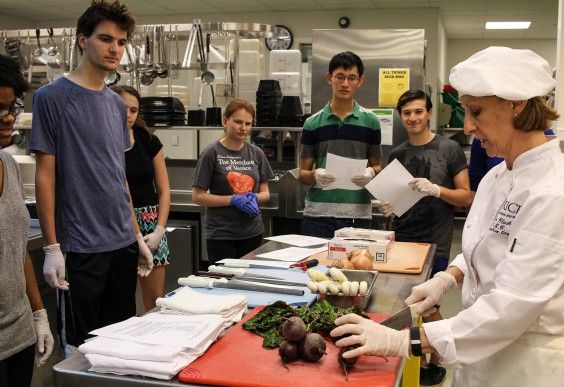The end of summer signals the start to a new school year. For many young adults that means heading back to college, and for some it means stepping onto campus for the first time.
There are lots of ways to rate these colleges, from the quality of academics to the party scene. We think an important—and often overlooked—metric is how healthy a university is. When putting together our list of the healthiest colleges, we looked for schools that go above and beyond to create an environment where students have access to an array of healthy food, top-notch fitness facilities, and robust medical and mental health services. For details on how we put together this ranking, scroll to the bottom of the list.
Editor’s Note: This list is presented in no particular order.
1. Rice University
Perhaps prompted by Title IX allegations that have emerged at schools across the country over the last few years, Rice’s sexual health resources are top-notch. Classes on Title IX rights, romantic relationships, and healthy sexuality are offered, as well as bystander, sexual, and domestic violence prevention education, through the school’s Project SAFE. On the administrative side, a student arm of the Office of Sexual Violence Prevention and Title IX Support ensures that student voices are heard. The healthy habits keep up throughout campus: The university uses the plate method in dining halls, which allows students to visualize a healthy meal without counting calories.
2. University of Missouri
Exercise-minded students should beware the University of Missouri—in all likelihood, no other gym or club will be able to compare to Mizzou’s amazing facilities. They include a cardio gallery with more than 100 pieces of equipment, lifting space, racquetball courts, a boxing gym, 10 hardwood courts, and the Tiger Grotto, a leisure pool with a lazy river, waterfall, and hot tub. Once you work up an appetite lounging around spring-break style, check out Zoutrition, a computerized nutrition information system that lets students check menu items for allergens and nutrition information.
3. Whitman College
This liberal arts college takes full advantage of the beautiful nature surrounding it. The food in the dining halls is made from scratch and seasonal ingredients are sourced from farms within 150 miles of the Walla Walla, WA, campus. The school’s bike share program allows students to check out a two-wheeler from the library for 24 hours. Plus each student gets credit to use at Whitman’s Outdoor Program for activities ranging from kayaking to snow shoeing. If that doesn’t satisfy your need for adventure, there’s always the climbing center with its 7,000-square-foot rock wall.
4. Stanford University
Life is good for those who avoid animal products at Stanford, voted Peta2’s favorite vegan-friendly college. The dining halls offer at least one vegan entrée and dessert at every meal. For the meat eaters and vegetarians on campus, the options are equally thoughtful. The school’s new Performance Dining Program, created in partnership with Stanford Athletics, the School of Medicine, and the Culinary Institute of America, is designed to help students perform “at their mental and physical peak.” That means antioxidant-rich foods as well as fare that lowers inflammation and enhances immunity and brain performance.
5. St. Mary’s College of Maryland
This school takes full advantage of its location on the St. Marys River by offering students lots of outdoor fitness options. Undergrads can sign out dinghies, paddle boards, Windsurfers, and kayaks from the school’s two docks. St. Mary’s is also strong on the mental health front: Students don’t have to worry about maxing out their counseling sessions. The Health and Wellness Center provides individual, couple’s, and group therapy for all students with no session limits. For those situations when you’d rather go to a friend or peer, the Sexual Misconduct Advocacy and Response Team (SMARTies) offers an outlet. Trained and supervised by a therapist, these students provide outreach and guidance on things like healthy relationships and consent.
6. Bowdoin College
Rather than offer a handful of meal options for the healthy minded, Bowdoin’s approach stands out by maintaining a healthy standard across the board, making vegetarian and vegan options so delicious you’d go for them anyway. All food is prepared in house, and the school even has its own bake and meat shops. Given that 99 percent of students are on a meal plan, these kinds of healthy eating efforts have a big impact. If students want to get even closer to their food, they can work in the school’s organic garden or take part in Meet What You Eat, a collaborative program where students learn about food-related issues like sustainability and nutrition.
7. University of Illinois, Urbana-Champaign
This Midwestern university has its own Student Sustainable Farm, which supplies fresh vegetables to the dining halls and hosts a farm stand on the quad once a week from May to November. The school has also taken a high-tech approach to healthy eating by offering an app that filters items on the dining hall menus by allergen or food preference. The university’s size also works to students’ advantage: There are more than 100 group fitness classes each week and 45 club sports teams, creating umpteen niches for students to find their health happy place.
8. Clemson University
Clemson has gone to great lengths to make fitness fun. The recreational center offers 75 fitness classes every week, with names like Solid COREange and We Too Deep, a water-based circuit training class. The university has also proven how well it listens to students’ needs and makes quick changes. Faced with increasing demand for mental health services, CU doubled the staff at Counseling and Psychological Services over the past few years to ensure all students have access to services including individual counseling and psychotherapy, psychiatry, group counseling, and skill-building workshops.
9. University of Massachusetts, Amherst
This Massachusetts state school is already a healthy place to be, with vegetarian, vegan, kosher, gluten-free, and halal diet options; an award-winning recreation center; more than 100 fitness classes per week; and Not Ready for Bedtime Players, a nationally known sexual health and social justice theater troupe. But the university continues to add more programs and facilities to foster healthy living. This spring the school opened the doors to the Women’s Health Clinic, a student-requested resource for routine gynecological care; contraception education and provision; and prenatal care, ultrasounds, and infertility care from obstetrical specialists. Soon the school will open a specialty clinic for transgender and gender-variant students and staff.
10. University of Texas, Austin
This Southern school has a lot of great stuff going for it. The enormous campus includes more than 500,000 square feet of indoor and 40 acres of outdoor recreational and activity space. Amenities range from a climbing wall to an aquatic complex with an outdoor lap pool and spa, and leisure pools with deck space and lounging areas. And it all goes to good use—91 percent of students utilize recreational facilities on campus. But where UT Austin really stands out is in its understanding of the modern college student: The school recently launched Healthyhorns Text Tips, a service that texts quick reminders of ways to stay healthy. Plus students can also check out the Healthyhorns Nap Map, an interactive tool to find the best places to get some quick shut-eye, as voted on by UT students.
11. Columbia University
Two decades ago, Columbia unveiled Go Ask Alice!, a resource for information on sexual and reproductive health. Today the university continues to innovate when it comes to student health initiatives. Columbia Health has a staff of 140 to cover any and all physical and mental health issues. The school also has a rape crisis and anti-violence support center and peer advocates for confidential emotional support. Health services also partners with the school’s dining services on lifestyle programs for exercise, stress relief, and healthy eating. And in a city full of boutique fitness options, Columbia’s 77 weekly group fitness classes hold their own.
12. Elon University
Most college freshmen do ice breaker after ice breaker when they first start. Elon takes it to the next level with the Elon Challenge Course, a high and low ropes course spread over 18 wooded acres, where students “work together to reach beyond their perceived boundaries, overcome obstacles, and experience success in a variety of problem-solving initiatives and ropes course elements.” Add in activities like hiking, white-water rafting, and paddle boarding, and the stress of classes has a slim chance of hanging around.
13. University of California, Davis
There’s no such thing as mystery meat when you step foot in one of the school’s three main dining halls. You’ll find the usual labels for special diets (vegetarian, vegan, and gluten-free), as well as stickers noting if the food is antibiotic free and if it meets Certified Humane and Food Alliance standards. Plus 20 percent of the food served in the dining commons is sustainably grown—some of it on the campus farm. Students aren’t just fed good grub, they’re also educated about it. The Healthy Planet, Healthy Me! program teaches undergrads about waste reduction, environmental stewardship, and sustainable agriculture. And the health and wellness center even gets involved on the education front, offering classes on topics like the downsides of juice cleanses and what to eat before exercising.
14. University of California, Los Angeles
The seemingly endless sunny weather isn’t the only thing that keeps students active on campus. UCLA has a remarkably robust fitness program with dozens of classes offered every day. They have the usual suspects (Zumba, yoga, and mat Pilates), in addition to plenty of creative classes, including a pop diva workout and a Bhangra Bollywood dance class. Don’t have time to swing by the gym? Take a fit break, a 15-minute bodyweight exercise class offered at least five times a day at convenient locations throughout campus. And in the off chance you pull or strain something while working out, you can head over to the Arthur Ashe Student Health and Wellness Center, where primary care, physical therapy, acupuncture, and massage are all available under one roof.
15. University of Dayton
The Ohio school makes The Princeton Review’s lists for best campus food and happiest students—and it makes sense that the former would lead to the latter. But the university gets these high marks in part from listening to students. In addition to typical vegan, vegetarian, and allergy-friendly fare, the school started offering halal and authentic Chinese food options in recent years after getting requests from its undergrads, which include a large population of international students. And once you’ve had a delicious meal, you can burn off all of that energy at the school’s impressive RecPlex. There’s always a pick-up game of basketball and racquetball going on, or you can just chill in the leisure pool and whirlpool spa.
16. University of Louisville
It’s no secret that school can get stressful, and Louisville has tons of initiatives in place designed to help students take a breather and chill out. The health promotion department offers mindfulness and meditation courses that have a special focus on stress management—there’s even one that teaches mindful eating (no Redbull here!). Plus if students really want to get their zen on, they can schedule a 30-minute massage. And during finals week—when tensions run particularly high—the school opens the calm café, stocked with everything you need to chill out, whether that’s a yoga mat or some soothing tea.
17. Ithaca College
The college workload can make it so easy to fall into a rut where all you’re doing is studying (or watching endless Netflix marathons). But Ithaca College has taken steps to entice students to stay active. At the forefront: inexpensive personal training. Sessions cost about $10 for an hour and can be done one-on-one or with a friend for even cheaper. But you don’t have to spend a penny to stay fit here. You can take advantage of the impressive fitness center, complete with a rock climbing wall, or head out and the explore the great outdoors of this upstate New York college on one of the trails that circle the perimeter of campus.
18. Kenyon College
All you need is a glimpse of the Kenyon Athletic Complex to know why this Midwest school has topped The Princeton Review’s list for the best athletic facilities two years straight. The behemoth sports complex includes a 200-meter track, Olympic-size indoor pool, basketball and volleyball arena, tennis center, and 12,000-square-foot fitness center with more than 200 pieces of equipment. It’s made all the more impressive when you realize Kenyon has just under 1,700 undergrads, so chances are you won’t have to wait in line for a weight machine. Rather get some fresh air? There’s a 480-acre nature preserve with plenty of trails for students to bike or hike.
19. Macalester College
This Minnesota school has gone the extra mile to promote the health and wellness of its students. Seven years ago, Macalester opened the Leonard Center, which houses a fitness complex and health services center under one roof—promoting the idea that wellness is about staying fit and taking care of yourself. So you can get your sweat on running a few laps on the 200-meter indoor track and then head down the hall to get your flu shot. Undergrads often gather in the building’s wellness lounge, a student-run space that’s always fully stocked with study snacks, health information, and safer sex products.
20. Binghamton University
Health and wellness have become a top priority since the university launched its B-Healthy initiative in 2013. Binghamton also became one of 20 colleges in the U.S. to join Partnership for a Healthier America’s campus initiative. Both of these programs aim to promote healthier lifestyles among undergrads, whether it’s providing sustainable food options in the dining halls or revamping the miles of walking trails around campus. Sourcing that sustainable, locally grown produce is made all the easier with the BU Acres Farm on campus. A highlight of every school year is the harvest festival when students and faculty pick crops—yellow squash, kale, pears, and apples—and prepare a feast for dinner.
21. Hamilton College
The stress of balancing schoolwork and a social life can be difficult, which is why it’s so great that Hamilton College has put an emphasis on providing robust mental health services. Any of the nearly 2,000 undergrads can meet one-on-one with a psychologist or psychiatrist without the worry of session limits that some colleges have. Plus the counseling center offers group therapy, nutrition counseling, and a special program called Therapy on the Rocks. The latter program utilizes the school’s rock climbing wall to help students work through issues relating to fear, confidence, or physical performance. The focus isn’t on getting to the top—it’s about the journey we take and the trust we need to have in ourselves to make progress.
22. Lewis and Clark College
Step foot on this campus in southern Portland, and you can’t help but want to spend time in the great outdoors. The campus includes 95 forested acres and miles of hiking trails. The school has made a name for itself with its sustainability program—it topped The Princeton Review’s list of green colleges this year. Many of the sustainability initiatives are integrally connected to helping students live healthier lives. In recent years, the school has promoted its bike-friendly campus, which includes a student-operated bike co-op to make repairs a cinch. When it comes to dining, the college ensures that at least one third of the food served is organically grown or locally sourced. The college also has dramatically reduced food waste by adding composting bins to the dining halls, and students can grab smaller bins for off-campus housing.
23. Oberlin College
For many, college is the first time they are given the opportunity to make dietary choices for themselves. So some people eat endless bowls of Froot Loops for dinner—because they can. But it’s easy to choose a healthy, balanced meal at Oberlin. The dining halls have labels to ID food that’s heart-healthy, locally sourced, certified organic, vegan, vegetarian, and gluten-free. But the college doesn’t stop at providing healthy options; it takes great strides to ensure the food is responsibly raised, whether it be hormone- and antibiotic-free meats, sustainable seafood, or cage-free eggs. Plus nearly a third of food served in the dining halls comes from local farms.
24. Tufts University
Dining halls can offer dozens of healthy options, but it often feels like parents telling their kids to eat veggies—we’re going to rebel because we want to do the opposite of what we’re told. That’s part of the reason Tufts started Balance Your Life, a student group that helps undergrads eat well and stay active without being too pushy or preachy. The student group hosts courses that students actually want to attend, like hump day cooking classes and supermarket sweep, an hour-long discussion with tips and tricks to buy healthy and cheap groceries when you move off campus.
25. Tulane University
This New Orleans school makes The Princeton Review’s lists for happiest students and best quality of life. Sure, the Southern hospitality helps with those top marks, but the school also goes to great lengths to ensure students are happy and healthy. The Reily Student Recreation Center is the hotspot of wellness on campus. Students can play pick-up basketball and volleyball, take a dip in the Olympic-size pool, and sweat it out on one of the dozens of cardio machines. Then they can head downstairs to theWELL, a one-stop shop for wellness at Tulane. The center offers programming and counseling for mental well-being, mindfulness, and sexual health.
How We Ranked the Colleges
We took all of the schools that made last year’s list and then asked our readers to submit additional nominations via social media. We rounded out our list of nominations with schools in the top 20 onTrojan’s Sexual Health Report Card as well as schools included in The Princeton Review’s lists for best campus food, best health services, best athletic facilities, best quality of life, and happiest students.
From there, we sent each nominated school a questionnaire asking about their dining services, fitness facilities, and student healthcare. Our rankings take into account many criteria, including special dietary options on dining hall menus, number of fitness classes offered, and available mental health resources. After rating each college or university, we whittled the list down to the top 25 you see here.
Do you feel like we missed a school? Feel free to send us an email and we’ll consider the college for next year’s ranking.




